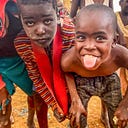Floods, locusts and COVID-19: Somalia’s triple crisis
UNDP Somalia’s Resident Representative, Jocelyn Mason, explains why emergency responses are critical but long-term development is needed more than ever
Somalia has come a long way in the last few years. The economy has been growing steadily and recent agreements on debt relief should boost funding for health, infrastructure and other development projects. Government services are expanding to reach more people every year. Progress on constitutional reform and power-sharing arrangements are putting in place systems for long-term stability.
But alarm bells started going off last year. In November 2019, huge floods displaced more than half a million people — the latest in a series of inundations that cost hundreds of millions of dollars almost every year. Shortly after, the same rains that had washed away homes and farms created the perfect growing conditions for the largest locust invasion for a quarter of a century. Hunger, last brought to Somalia by drought in 2017, suddenly threatened to return on the wings of a billion insects.
Then in April, local news sites started to replace insect swarms with footage of men in crowded graveyards wearing hazmat suits to protect them from COVID-19. Official statistics would record more than 3,000 people infected by August, but limited testing means that actual numbers are likely to be have been far higher than official statistics suggest. Anecdotally, flu-like symptoms have seen a sharp uptick in urban areas, burial grounds have become more crowded and a number of well-known figures with access to testing have fallen ill, suggesting that infection rates have also been high among those who can’t get tested and don’t get noted.
Unlike many other countries, where COVID-19 still threatens to overwhelm the health system, Somalia has been struggling for years to provide healthcare. It has one of the highest doctor to patient ratios in the world and one of the lowest global supplies of beds, PPE, ventilators and other essential equipment. For many Somalis there was no health system to overwhelm, and nowhere to go for those who need medical attention with COVID-19.
The fallout has also extended beyond healthcare. On the economic front, the government predicts a GDP reduction of 11 percent for 2020, while remittances, which fund the basic needs of almost half of all Somali families, have fallen more sharply than any time in recent history. For the majority of Somalia’s 15 million people, who live on less than US$2 a day, this latest economic blow could be disastrous. Some 3.5 million people are already expected to need food assistance later this year.
On the security front, Al Shabab is still active, especially in the central region and the south. It is hard to get a picture of how COVID-19 is unfolding in territories controlled by the terrorist group, but large economic and social disruption risks opening new opportunities for them to exploit.
In the political sphere, achieving a settlement on the federal model that best fits Somalia, agreeing a revised constitution, holding elections and ensuring the political representation of women, youth and minorities are all state building blocks that risk being undermined by the impact of rolling humanitarian crises before they are fully cemented into place.
It is imperative that we respond at speed and at scale to this triple crisis of flooding, locusts and disease, so UNDP is directing new resources to meet the immediate threat of COVID-19, including a communications campaign that has mobilized the religious community, the media, the security sector and the entertainment industry to reach millions with life-saving information, including many of Somalia’s 2.6m IDPs and other vulnerable groups.
We are also supporting local businesses to produce life-saving personal protection equipment, such as face masks, that meet WHO standards and are purchasing them for distribution to health care workers.
But even as we address the immediate humanitarian emergency, we don’t believe it makes sense to view it in isolation. When a country reels from crisis to crisis, each one costing hundreds of millions of dollars and leaving people unprepared for the next, it’s not a series of emergencies — it’s the status quo. And so what is required in response, are not just emergency measures, but a sustained programme of development assistance to build the systems, skills, infrastructure and institutions needed to withstand future disasters, which we know are coming, if not this year then next.
That’s what UNDP is for, and that’s why we are advocating for a developmental perspective in line with the 2030 Agenda, even in the face of this triple humanitarian threat. We need to maintain steady progress on the Sustainable Development Goals if we are to preserve the gains so painfully achieved over the past few years and ensure that the future for Somalis is one that replaces alarm bells with hope.
To this end, UNDP continues to work with the UN political mission (UNSOM) to facilitate political dialogue. More widely, through our work on local governance, we support the provision of government services, from garbage collection to healthcare, that can cement the relationship between the citizen and the state.
We are also continuing our assistance to the police and justice institutions, including new work to keep the police themselves safe from COVID-19 and to advocate for the release of minor offenders from overcrowded jails, of whom nearly 1,000 have already been released.
The Secretary General has asked UNDP to be the technical lead agency for the socio-economic response to COVID-19, and as such we are also undertaking an impact assessment to establish baselines and priority areas for UN development assistance.
We believe firmly that if we can maintain the development momentum even as we address humanitarian needs, Somalia will be able to hold on to the gains made in recent years and emerge stronger than ever.
